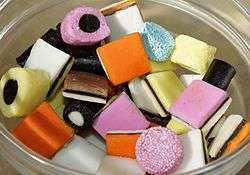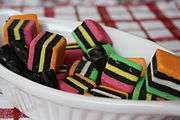Liquorice allsorts
 | |
| Type | Confectionery |
|---|---|
| Place of origin | United Kingdom |
| Region or state | Sheffield |
| Created by | Geo. Bassett & Co |
| Main ingredients | Liquorice, sugar, coconut, aniseed jelly, fruit flavourings, gelatine |
Liquorice allsorts are assorted liquorice confectionery sold as a mixture. Made of liquorice, sugar, coconut, aniseed jelly, fruit flavourings, and gelatine, they were first produced in Sheffield, England, by Geo. Bassett & Co Ltd.
Allsorts are produced by many companies around the world, but are most popular in Britain and continental Europe (especially the Netherlands where they are called Engelse drop, meaning English liquorice). South African confectionery giant Beacon produces substantial quantities of the product, selling it locally and exporting it to Australia, Canada, and Portugal.
History
In 1899, Charlie Thompson, a Bassett's sales representative, supposedly dropped a tray of samples he was showing a client in Leicester, mixing up the various sweets. After he scrambled to re-arrange them, the client was intrigued by the new creation. Quickly the company began to mass-produce the allsorts and they became a successful product.

Bassett's have released two varieties of allsorts that do not feature any liquorice. Fruit Allsorts feature mixed-fruit flavoured sweets, while Dessert Allsorts have flavours such as apple tart and lemon cheesecake. Both retain the shapes and textures of the original sweet. Red allsorts, with fruit-flavoured liquorice, were briefly released in the late 1990s, discontinued and later reintroduced to the UK with flavours including Blueberry Cube, Strawberry Check, and a red liquorice "Betty Bassett".
During the 1970s, the sweets were promoted in television commercials with the slogan: "All sorts love Allsorts and Bassett's make 'em best!"
Names
The original items mixed by Thompson were "chips, rocks, Buttons, nuggets, plugs and twists".[1] It is not clear which, if any, correspond to Bassets traditional allsorts, though certainly newer items have been introduced, such as the Bertie.
The aniseed jellies are known as horse cakes, spogs or jelly buttons.
Bertie Bassett
The Bassett's company mascot is Bertie Bassett, a figure made up of liquorice allsorts, which has become a part of British popular culture. The character's origins lie with advertising copywriter Frank Regan, who used the sweets and a number of pipe-cleaners to construct what was the original version of Bertie. One of the sweets in the modern day allsorts mix is a liquorice figure shaped like Bertie.
The Doctor Who television serial episode The Happiness Patrol featured a villain called the Kandy Man, who resembled Bertie Bassett. Although an internal investigation concluded that the programme had not infringed on Bassett's trademark, the BBC promised Bassett's that the Kandy Man would not appear again.[2]
In the 2001 satirical comedy film Mike Bassett: England Manager, the figure of Bertie Bassett appears in a short scene on a newspaper with the headline "Bassett's Allsorts".
As a publicity stunt, Bassett's staged a mock wedding between actors dressed as Bertie and Betty Bassett, another character made of sweets, at its Sheffield factory, in February 2009.[3]
See also
References
- ↑ Cadbury's, Our Brands: Bassett's
- ↑ Sullivan, Shannon Patrick. "The Happiness Patrol". A Brief History of Time (Travel). Retrieved 11 April 2009.
- ↑ "Sweet new bride for Bertie at 80". Metro.co.uk. 13 February 2009. Retrieved 12 January 2010.
External links
